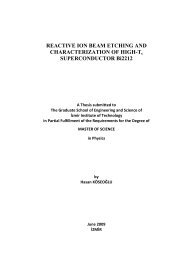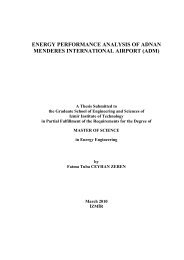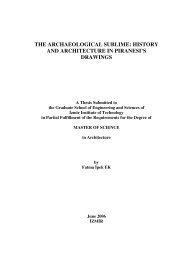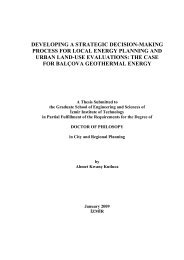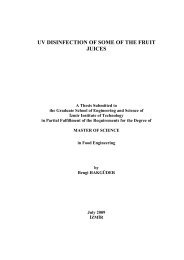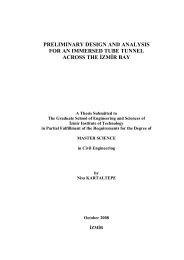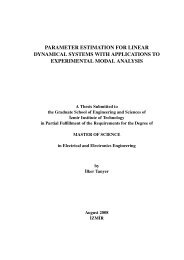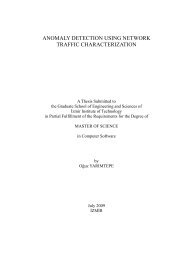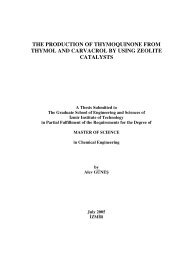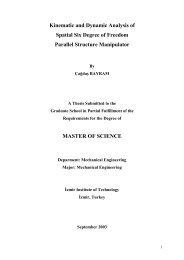a critical evaluation on the concept of justice in planning process
a critical evaluation on the concept of justice in planning process
a critical evaluation on the concept of justice in planning process
Create successful ePaper yourself
Turn your PDF publications into a flip-book with our unique Google optimized e-Paper software.
c<strong>on</strong>tent “rule <strong>of</strong> law” is described as a state protect<strong>in</strong>g liberty through law (Sancar,<br />
2000a, 35).<br />
Accord<strong>in</strong>g to Sancar, “rule <strong>of</strong> law” depend<strong>in</strong>g <strong>on</strong> <strong>the</strong> base <strong>of</strong> “negative liberty”<br />
gives opportunity for capitalist producti<strong>on</strong> development dynamics. In <strong>the</strong> center <strong>of</strong> <strong>the</strong><br />
idea and model <strong>of</strong> liberal rule <strong>of</strong> law, which developed start<strong>in</strong>g with mid-17 th century<br />
and c<strong>on</strong>t<strong>in</strong>ued develop<strong>in</strong>g through 18 th century, rights <strong>of</strong> ownership, agreement and<br />
work<strong>in</strong>g liberty and pr<strong>in</strong>ciple <strong>of</strong> formal-legal equality take place. This system, <strong>in</strong> order<br />
to be able to realize <strong>the</strong> political and legal equality also keeps <strong>the</strong> n<strong>on</strong>-ec<strong>on</strong>omic side <strong>of</strong><br />
<strong>in</strong>dividualistic development. A c<strong>on</strong>ceptual-historical study <strong>of</strong> “rule <strong>of</strong> law” should take<br />
“bourgeois” “rule <strong>of</strong> law” as <strong>the</strong> start<strong>in</strong>g po<strong>in</strong>t. C<strong>on</strong>cept <strong>of</strong> “rule <strong>of</strong> law” came out as<br />
creati<strong>on</strong> and requirement <strong>of</strong> a liberal bourgeois (Sancar, 2000a,).<br />
Accord<strong>in</strong>g to Özlem “democratic rule <strong>of</strong> law” is a type <strong>of</strong> state developed after<br />
Enlightenment Era. He discusses “democratic rule <strong>of</strong> law” as a sub-title <strong>of</strong> “rule <strong>of</strong><br />
law”; he takes note to <strong>the</strong> ma<strong>in</strong> differentiati<strong>on</strong>s between “liberal rule <strong>of</strong> law” and “social<br />
rule <strong>of</strong> law”. Even though <strong>the</strong>ir start<strong>in</strong>g po<strong>in</strong>t is liberty and equality pr<strong>in</strong>ciples; first<br />
gives accent to liberty, and <strong>the</strong> sec<strong>on</strong>d to <strong>the</strong> equality. Properties <strong>of</strong> today’s democratic<br />
rule <strong>of</strong> law and even fur<strong>the</strong>r “liberal democratic rule <strong>of</strong> law” are; liberty <strong>of</strong> selecti<strong>on</strong> and<br />
electi<strong>on</strong>, liberty <strong>of</strong> testim<strong>on</strong>y and organiz<strong>in</strong>g, legal equality, <strong>in</strong>dependency <strong>of</strong> courts,<br />
separati<strong>on</strong> <strong>of</strong> legislative, judicial and executive powers (separati<strong>on</strong> <strong>of</strong> powers), physical<br />
and psychological immunity <strong>of</strong> <strong>in</strong>dividuals, existence <strong>of</strong> develop<strong>in</strong>g and realiz<strong>in</strong>g<br />
c<strong>on</strong>diti<strong>on</strong>s <strong>of</strong> people <strong>in</strong> spite <strong>of</strong> <strong>in</strong>come varieties, acceptance <strong>of</strong> varieties rules <strong>of</strong><br />
plurality (Özlem, 1999, 88-93).<br />
Özlem, menti<strong>on</strong>s that <strong>the</strong> ma<strong>in</strong> aims <strong>of</strong> <strong>the</strong> state and laws <strong>in</strong> social state are to<br />
establish a balance between <strong>the</strong> rights and liberties and elim<strong>in</strong>ate all <strong>the</strong> negativenesses<br />
<strong>of</strong> “state <strong>of</strong> law”. C<strong>on</strong>cept <strong>of</strong> “social state” emerged as <strong>the</strong> result <strong>of</strong> reacti<strong>on</strong> to <strong>the</strong><br />
<strong>in</strong>equalities caused by capitalist development. In this sense, social state is thought as a<br />
state aim<strong>in</strong>g to m<strong>in</strong>imize <strong>the</strong> <strong>in</strong>equalities am<strong>on</strong>g classes, and also try<strong>in</strong>g every citizen to<br />
benefit from social and cultural opportunities. This type <strong>of</strong> state discretes from <strong>the</strong><br />
c<strong>on</strong>cept <strong>of</strong> “laissez fair, laissez alle” <strong>of</strong> ec<strong>on</strong>omic liberalism and has a property <strong>of</strong><br />
<strong>in</strong>terfer<strong>in</strong>g <strong>the</strong> ec<strong>on</strong>omy <strong>in</strong> order to protect <strong>the</strong> poor classes and groups. Aim <strong>of</strong> social<br />
state is to distribute <strong>the</strong> social wealth and services equally, <strong>in</strong> order to prevent extreme<br />
<strong>in</strong>equalities <strong>in</strong> <strong>in</strong>come and ownership. Social state reduces <strong>the</strong> arguments and c<strong>on</strong>trasts<br />
between social classes and groups by perform<strong>in</strong>g this functi<strong>on</strong>. In social state because <strong>of</strong><br />
priority <strong>of</strong> equality, positive liberties also come <strong>in</strong>to agenda as balanc<strong>in</strong>g comp<strong>on</strong>ents<br />
35



